There has never been a day in the history of Canadian tennis at the French Open like Thursday. For a grand total of seven hours and 24 minutes two Canadian players – Denis Shapovalov and Leylah Annie Fernandez – had their compatriots mesmerized and emotionally-wrung out as they followed them from afar.
Shapovalov played what was arguably the best, boldest match ever by a Canadian man at Roland Garros, but lost in a riveting five hours 7-5, 6-7(5), 6-3, 3-6, 8-6 to Roberto Carballes Baena after twice serving for the match and twice being two points from victory.
Fernandez, just 25 days after turning 18, became the youngest Canadian – Carling Bassett-Seguso was 19 in 1987 – to make it to the third round in Paris with a 6-4, 3-6, 6-1 victory in two hours and 26 minutes over No. 47-ranked Polona Hercog.
The Shapovalov – Carballes Baena contest was an absolute spellbinder, and both of them gave it their all. Shapovalov by maintaining his explosive, full-tilt hitting right until the very end; Carballes Baena with his incredible ability to hang in (and prolong) rallies with the No. 9 seeded Canadian despite being completely outgunned.
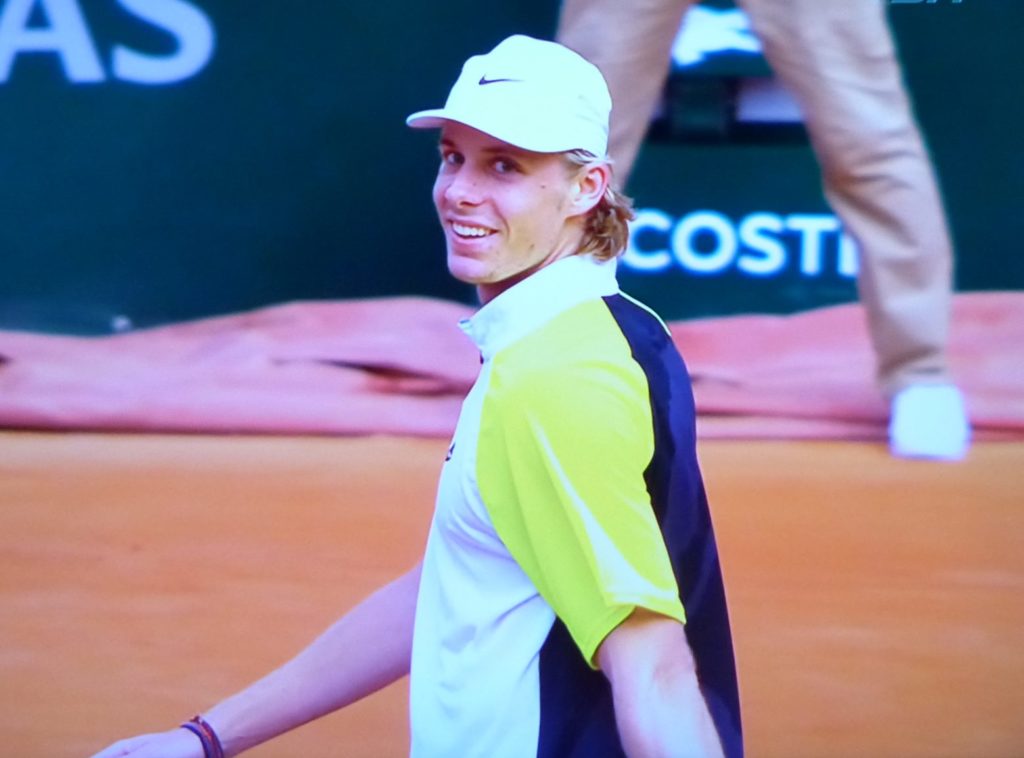
Sadly for Shapovalov (in a happier moment above), despite his heroic efforts two statistics told the story. He was an impressive 73/103 (71 per cent) at the net but the final two points, when he served at 6-7 in the fifth set, both ended in missed volleys – one into the net and one long. As well, before those last two points the players were dead even in total points at 194 each. So those volley misses made the final count 196 – 194 for the No. 101-ranked player from Spain.
“I mean, it’s impossible to hit a winner (he had 65 to go with 106 unforced errors) with these balls,” was Shapovalov’s somewhat exaggerated remark about his two fateful forays forward at the end of the match, “so I figured I might as well come to the net because I’m just not going to sit there and play a 10-hour match. Yeah, that’s, honestly, why I was coming in. There was just no point to stay from the back.”
The momentum changes at the end of the match were surreal, to use the modern parlance. Serving for the match at 5-4 in the fifth, Shapovalov had it all going his way at 30-love. Carballes Baena had fought hard but it seemed like just a formality for the 21-year-old from Thornhill, Ont. to finish him off. But after disputing a line call on the Carballes Baena baseline that made the score 30-all, Shapovalov made two unforced errors and the set was even at 5-all.
Then, with everything suddenly going in his favour when he served at 30-love in the following game, Carballes double-faulted and eventually lost the game as Shapovalov put away a crisp forehand volley winner.
With another chance to serve out the match ahead 6-5, Shapovalov started with his 11th double fault but again got to 30-all and then deuce after saving a break point. But a forehand error and then a backhand winner by Carballes Baena and it was again knotted – at 6-6.
The 27-year-old Spaniard then held serve to 30 as Shapovalov missed successive service returns with the score even at 30-all.
In the final game, in keeping with the up and down nature of the match, Shapovalov double-faulted to make it 15-30 and then leveled the game at 30-all with his 7th ace. In the ultimate game, those two missed volleys provided an anticlimactic finish to the tantalizing drama in the pandemic-era, virtually-empty Court Suzanne Lenglen.
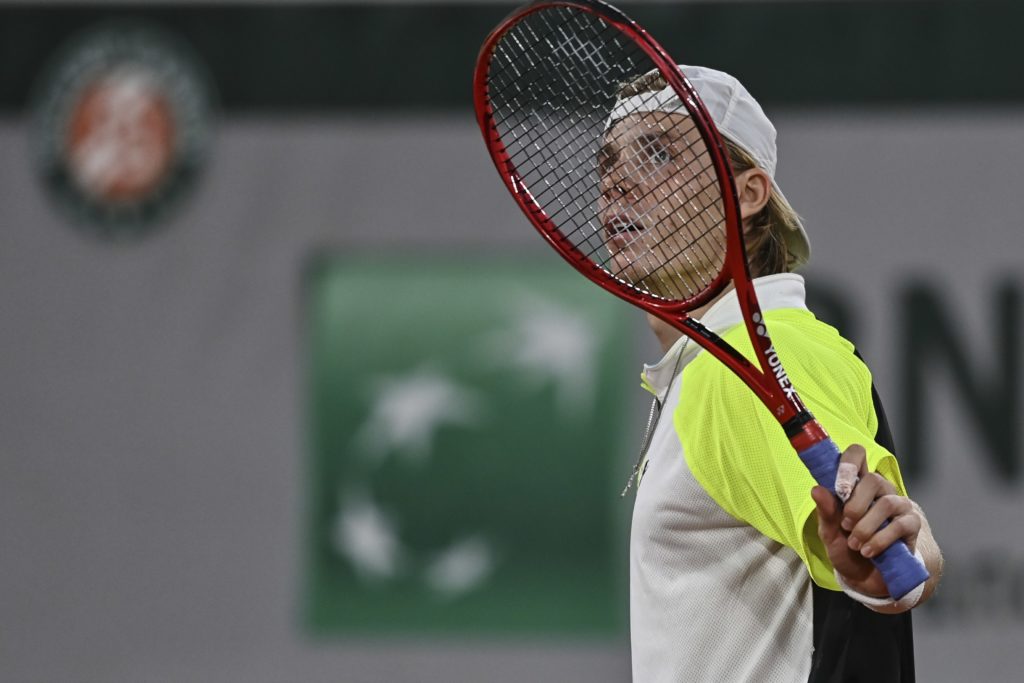
Enough can’t be said about how well Shapovalov played from the baseline. Powerful-packed, one-handed backhand, shot-making players of his ilk – including Frenchman Henri Leconte in the 1980s, German Boris Becker in the 1980s and 1990s, Czech Petr Korda in the 1990s and Swiss Roger Federer in the 21st century – usually struggle to maintain aggressive play in rallies from the backcourt on clay when an opponent is as unwaveringly consistent as Carballes Baena was – especially in conditions such as Thursday with the court playing slow in 15 degree Celsius temperatures.
Shapovalov gave a similar sensational display in a 6-4, 5-7, 7-6(4) semi-final loss to the dogged Diego Schwartzman at the Italian Open, although he emphasized on Thursday that things had been much more favourable (warmer) in Rome.
“Honestly I feel like the conditions were as tough as possible for me to play against here, with the balls being just so heavy and it being really cold,” Shapovalov said. “I mean, I play an aggressive game, I like to step in, and I mean he just had so much time. So it was very difficult. I’m really happy that I was able to bring myself to a winning position, and then in the end it’s just a little bit unlucky. He misses a return one inch out and it’s 40-15 (at 5-4 in the final set), it’s a completely different story – so just a little bit of luck at the end. I did everything right today, it just didn’t go my way.
“I think I’m playing some good tennis, so I just want to keep that up. I’m happy again that I was in the position to win and won my first round, because these conditions were completely stacked against me. So I’m happy with the tennis I’m playing. I’m not going to let this tournament affect me and I’m just going to keep going.”
He mentioned that he tweaked his hamstring – taking an off-court medical time-out midway through the second set – but suggested it was a minor issue.
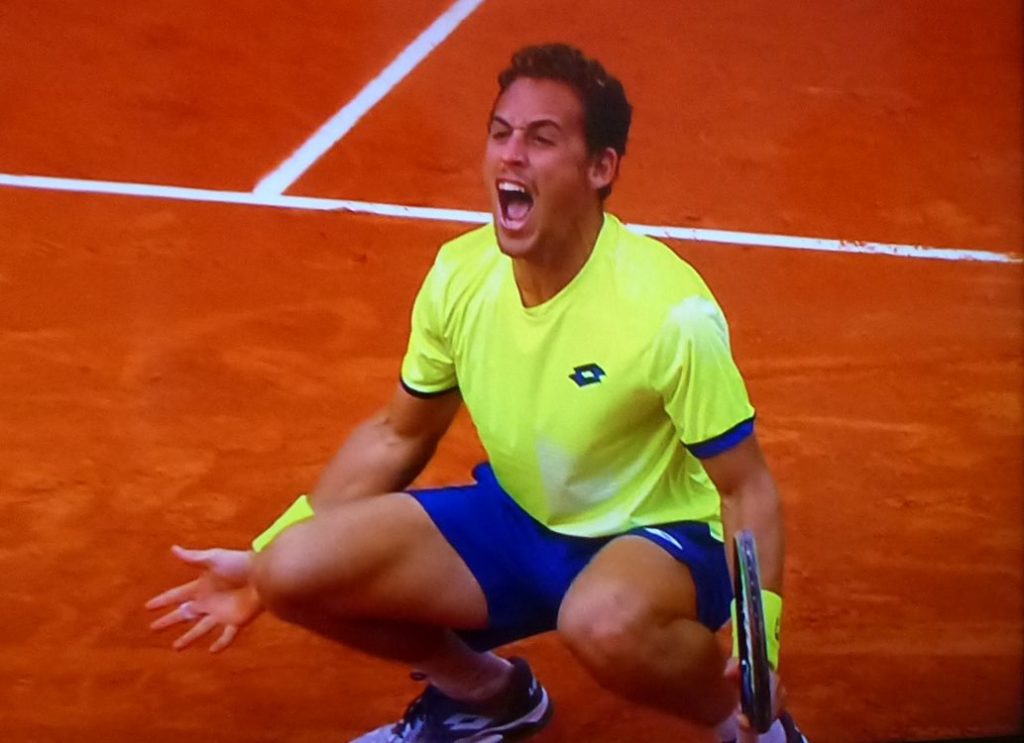
While Shapovalov was disappointed by the opportunities lost, the victor, Carballes Baena was beside himself after the win. The smiling resident of Granada said during a post-match interview on court with former French player Cedric Pioline, “It’s a dream for me to win a match like this on this court.”
Carballes Baena, who has 18 Challenger titles and previously had a best career win over David Goffin, added about his victory, “I tried to be very solid and focus on my game. Shapovalov serves very good and he’s very aggressive, but I think I did a very good match. For me it’s amazing, it’s the first time I’ve beaten a top-10 (Shapovalov is actually No. 11 this week), the first time I’m in the third round in a Grand Slam and the first time that I win a match in the fifth set. I can’t be more happy.”
Shapovalov’s explosive game-style is as breathtaking as it gets in tennis. For a while Nick Kyrgios looked like he might be able to be the modern miracle hitter on the pro tour. But now it is clearly Shapovalov with a fifth-gear, assortment of exceptional shots and – maybe something that goes unnoticed – his supreme fitness. He was able to perform to the max Thursday in Court Suzanne Lenglen – and looked fresh compared to Carballes Baena in the final stages of the match.
The loss will not be a happy memory for Shapovalov but it can be a springboard for greater things as he has indisputably assumed the mantel of the most spectacular player in men’s tennis.
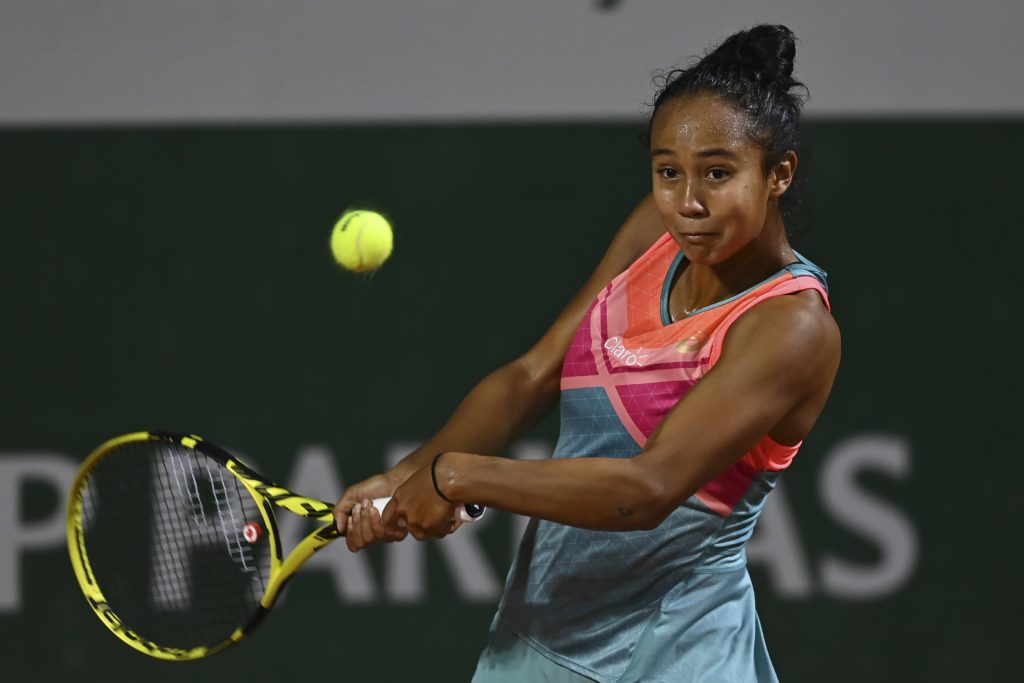
Fernandez, or anyone for that matter, will not be able to match Shapovalov’s flair but she’s every bit his equal when it comes to determination and dedication.
The current World No. 100 – her ranking will rise to No. 86 after Thursday’s victory – is a seemingly indefatigable bundle of energy and commitment – never wavering from the task at hand on the court.
Against the No. 47-ranked Hercog on Court 5 on Thursday, 11 years younger and about eight inches shorter than the 6-foot Slovene, Fernandez was metronomic in her ball-striking. She controlled most rallies with relentless hitting – finishing with a 28/31 winners to unforced ratio compared to 31/42 for Hercog.
It was obvious that Fernandez was never going to back down and that seemed to eventually get to Hercog.
The progression for Fernandez – qualifying for her first Grand Slam at the Australian Open in January, winning a round at the US Open last month and now winning two rounds at the French Open – has been remarkable.
Her ambition on court contrasts with a modesty and friendliness off it that makes her a welcome addition to the top ranks of the Canadian tennis scene. “Well, I don’t think I’ve changed much,” she said after Thursday’s win, comparing herself to 15 months ago when she won the Roland Garros junior girl’s title. “I’m still as energetic and as polite, nice as always. Still, like, a pretty young kid trying to make it as a professional. I’m just happy to be here. It’s a big tournament, an honor to be back in a professional circuit, playing in a Grand Slam – happy to get the win to be in the third round.”
Against Hercog, she needed a 13 minutes to break serve in the opening game of the final set before dropping serve herself. But she then proceeded to hunker down and completely wore out Hercog with a five-game run to wrap up the match.
“It’s mostly my fight and hard work,” she said about her success so far at Roland Garros. “These two players are great players, Magda (Linette, the No. 31 seed in the first round) and Polona – both are top-50 players for a reason. It wasn’t going to be easy. I’m happy to get that one ball back in, you know, fight through to the end.”
Fernandez and her family, father Jorge, mother Irene and younger sister Bianca have sacrificed for her career, making the move two years ago from Montreal to Boynton Beach, Florida, where she has lived and often practiced on public courts with her sister. For reaching the third round, she will receive 126,000 Euros or $195,500 (Canadian) in prize money.
“I’m happy with the prize money I’m getting,” she said. “But I don’t think about that. I think about my matches, my next (ranking) points. I hope I can win my next round (against No. 7 seed Petra Kvitova) but it won’t be easy.”
Her goal was to be in the top 100 by the end of the year but that has been revised. “I’d like to be in the top-60, the top-50 as quickly as possible for next year,” she said.
Kvitova, currently ranked No. 11, will be a tough opponent for Fernandez. But in 2020 she has already beaten a world No. 5 – Belinda Bencic during a Fed Cup tie in Switzerland in February.
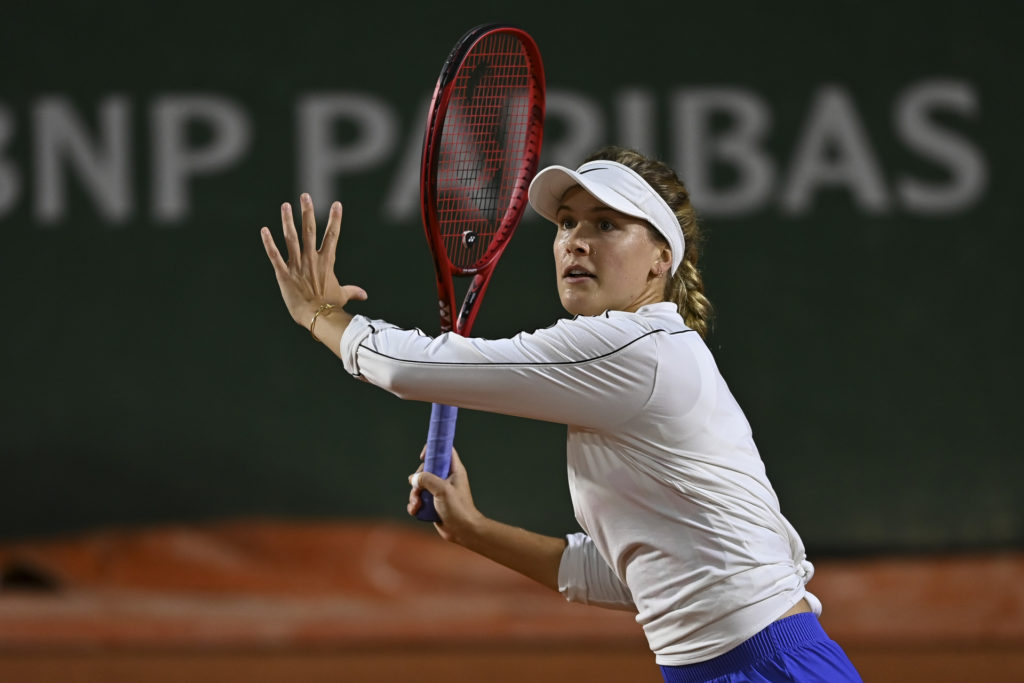
On Friday Genie Bouchard will attempt to reach the round-of-16 when she faces No. 54-ranked Iga Swiatek. The 19-year-old Pole is remarkably experienced in terms of a Roland Garros past. In 2018, she reached the semi-final of the junior girls event before losing to Caty McNally of the U.S. She ended the year at No. 175 in the WTA rankings but moved that to No. 61 by the end of 2019, a year that included her getting to the round-of-16 at the French Open before losing to defending champion Simona Halep.
“I always learned a lot here,” Swiatek said after defeating Hsieh Su-Wei 6-1, 6-4 in Wednesday’s second round. “Like most of big steps that I had in my career was basically here. Even last year when I lost against Simona on Philippe Chatrier and the match was – it lasted like 40 minutes – it was a big lesson for me.”
Swiatek (below) and Bouchard won’t be on Chatrier but on Court Simonne Mathieu starting at 11 a.m. (5 a.m. ET Canada).
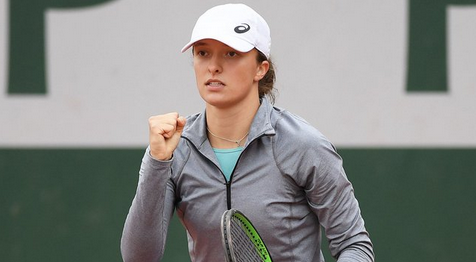
On Wednesday, Bouchard needed a set to break free of a tenacious Daria Gavrilova before polishing off a 5-7, 6-4, 6-3 victory in two hours and 26 minutes.
As she gained confidence, Bouchard took control of the rallies and by the last few games was hitting a steady stream of winners past the scampering 26-year-old Australian.
Bouchard is showing some of the form that got her to the Roland Garros semi-finals in her magical 2014, a year that ended in Paris in a hard-fought 4-6, 7-5, 6-2 loss to eventual champion Maria Sharapova. This is her first trip past the second round since 2014 and has moved her No. 168 ranking up to approximately No. 140.
She claims (and looks) to be fitter than she ever has following months during the pandemic working with famed fitness trainer Gil Reyes in Las Vegas. She also has a greater appreciation for her chosen sport in now her eighth year on the tour.
“I’ve tried to push myself in every chance I’ve had because I know there are so few,” she said Wednesday. The WTA main tour only has two firm tournament commitments for the rest of the year – in Ostrava, Czech Republic, next month and in Limoges, France, in December. Two other October events – Seoul, Korea and Linz, Austria are listed as to be re-scheduled.
A win over Swiatek would move Bouchard’s ranking to about No. 114, creeping closer to the No. 108 cut-off for the 2021 Australian Open – it depending on withdrawals (and they could be numerous if COVID-19 lingers) and how many players enter using protected rankings.
BUNDLING UP IN PARIS
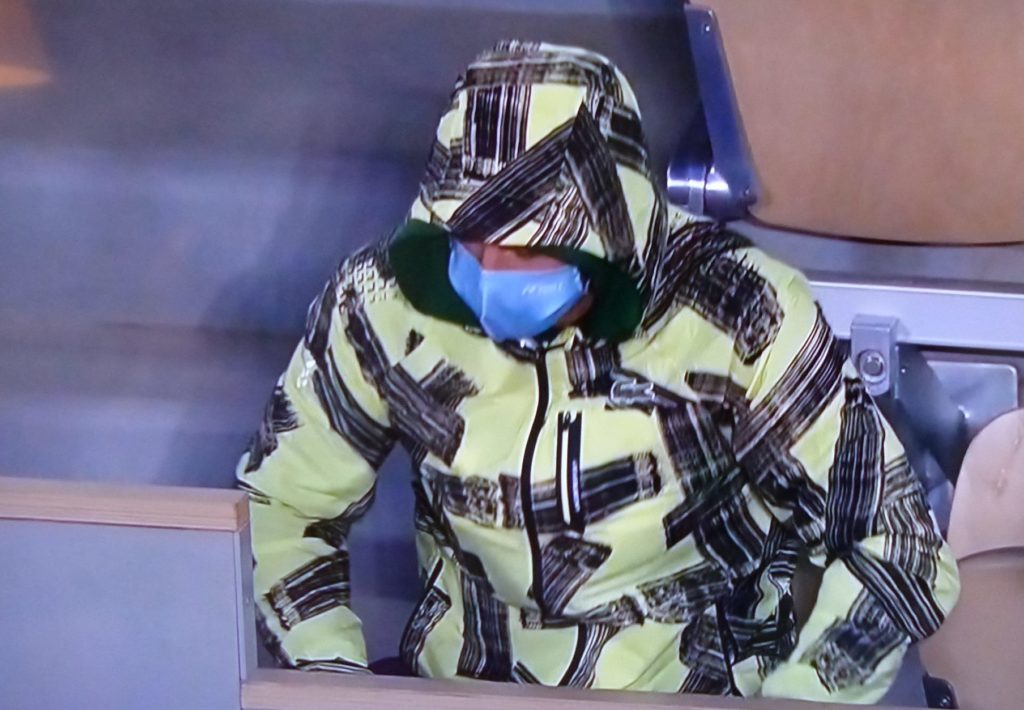
With the temperature at 16 degrees Celsius on Wednesday evening, the Court Philippe Chatrier spectators were showing off their Parisian autumn wardrobes. One of them was veteran Nicolas Mahut of France watching his doubles partner, Pierre-Hughes Herbert, lose a tough five-setter to No. 6 seed Alexander Zverev.






